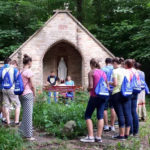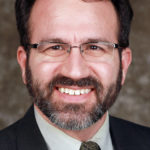Catholics praying the rosary in a small town in our diocese expressed sadness that the wound of clergy sexual abuse has been reopened. “We thought it was over,” one of them said. It’s not. Reaction to last week’s release of a Pennsylvania grand jury report on clergy sexual abuse committed over a 70-year span demonstrates that we still have lessons to learn about accountability and the sin of the abuse of power.
Some of our Catholic Church’s leaders — in six dioceses in the state of Pennsylvania — hid allegations of sex abuse of minors and brushed aside the victims, according to a grand jury report released Aug. 14. More than 300 priests were linked to abuse claims, and more than 1,000 victims were identified (Catholic News Service, see Page 6).
The report that details the appalling betrayal of the mission Christ entrusted to his apostles and their successors leaves all of us who call ourselves Christians bereft and angry at the same time. The description of the crimes against children is disgusting and heart-breaking. It was an abuse of power. Bishops who should have stopped this pain and suffering protected themselves instead.
We’ve known that fact for at least 16 years, when the crisis broke in Boston and made headlines worldwide. Many of the abuse cases happened decades ago but came to the forefront in 2002 because of investigative reporting by the secular press. The U.S. Conference of Catholic Bishops (USCCB) adopted the Charter for Protection of Children and Young People and implemented norms to prevent this tragedy from ever happening again.
To a large degree, this charter has had a positive effect on raising awareness about the need to protect children and to prevent abuse. That’s certainly been the case in our diocese, which implemented the charter but also instituted additional measures as part of a bankruptcy settlement. Bishop Thomas Zinkula makes note of the Diocese of Davenport’s commitment in a statement that appears on Page 1.
The scab of healing has been ripped open by a growing awareness that some bishops advanced the ecclesial ladder despite evidence that they were abusers or failed to stop other clergy from abusing.
The USCCB approved a revision of the Charter for the Protection of Children and Young People just two months ago. But the charter doesn’t address discipline of bishops until page 29 of the 30-page document. It calls for self-reporting and for bishops to report one another to the Apostolic Nuncio. Canon law requires the pope’s personal approval before a bishop can be removed from office.
Perhaps canon law should be changed, but first let’s focus on the existing reporting mechanisms, which fall short. The charter should be amended to include information on how individuals outside the episcopacy can make a complaint against a bishop. The USCCB’s Executive Committee is now calling for more lay involvement in the investigation of bishops, which is a good start.
A three-point plan that USCCB President Cardinal Daniel DiNardo announced last week deserves our endorsement as a starting point:
• An investigation into the questions surrounding Archbishop Theodore McCarrick’s rise in the episcopal ranks despite accusations against him.
• An opening of new and confidential channels for reporting complaints against bishops.
• Advocacy for more effective resolution of future complaints.
The three-part plan calls for “proper independence, sufficient authority, and substantial leadership by laity” and will be presented to the full body of bishops at their November meeting. Cardinal DiNardo also will travel to Rome to present the plan to the Holy See.
Read the plan on the USCCB website at www.usccb.org. Support it by sending an email to the USCCB at www.usccb.org/about/contact-us.cfm or by writing a letter to the U.S. Conference of Catholic Bishops, 3211 Fourth St. NE, Washington, D.C., 20017. Ask Bishop Zinkula to support the plan at the November meeting. You can reach him at bishop@davenportdiocese.org.
Pray for the victims, pray for the perpetrators, pray for all of us. When one member of the body of Christ hurts, all of us hurt. We need to work together to heal the wound.
Barb Arland-Fye, Editor
(arland-fye@davenportdiocese.org)











